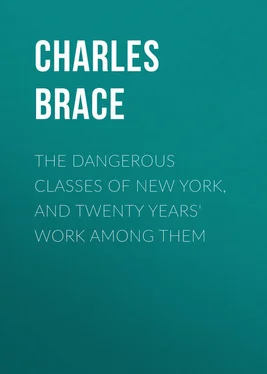Charles Brace - The Dangerous Classes of New York, and Twenty Years' Work Among Them
Здесь есть возможность читать онлайн «Charles Brace - The Dangerous Classes of New York, and Twenty Years' Work Among Them» — ознакомительный отрывок электронной книги совершенно бесплатно, а после прочтения отрывка купить полную версию. В некоторых случаях можно слушать аудио, скачать через торрент в формате fb2 и присутствует краткое содержание. Издательство: Иностранный паблик, Жанр: foreign_antique, foreign_prose, на английском языке. Описание произведения, (предисловие) а так же отзывы посетителей доступны на портале библиотеки ЛибКат.
- Название:The Dangerous Classes of New York, and Twenty Years' Work Among Them
- Автор:
- Издательство:Иностранный паблик
- Жанр:
- Год:неизвестен
- ISBN:нет данных
- Рейтинг книги:5 / 5. Голосов: 1
-
Избранное:Добавить в избранное
- Отзывы:
-
Ваша оценка:
- 100
- 1
- 2
- 3
- 4
- 5
The Dangerous Classes of New York, and Twenty Years' Work Among Them: краткое содержание, описание и аннотация
Предлагаем к чтению аннотацию, описание, краткое содержание или предисловие (зависит от того, что написал сам автор книги «The Dangerous Classes of New York, and Twenty Years' Work Among Them»). Если вы не нашли необходимую информацию о книге — напишите в комментариях, мы постараемся отыскать её.
The Dangerous Classes of New York, and Twenty Years' Work Among Them — читать онлайн ознакомительный отрывок
Ниже представлен текст книги, разбитый по страницам. Система сохранения места последней прочитанной страницы, позволяет с удобством читать онлайн бесплатно книгу «The Dangerous Classes of New York, and Twenty Years' Work Among Them», без необходимости каждый раз заново искать на чём Вы остановились. Поставьте закладку, и сможете в любой момент перейти на страницу, на которой закончили чтение.
Интервал:
Закладка:
In these dens of crowded humanity, too, other and more unnatural crimes are committed among those of the same blood and family.
Here, too, congregate some of the worst of the destitute population of the city – vagrants, beggars, nondescript thieves, broken-down drunken vagabonds, who manage as yet to keep out of the station-houses, and the lowest and most bungling of the "sharpers." Naturally, the boys growing up in such places become, as by a law of nature, petty thieves, pickpockets, street-rovers, beggars, and burglars. Their only salvation is, that these dens become so filthy and haunted with vermin, that the lads themselves leave them in disgust, preferring the barges on the breezy docks, or the boxes on the side-walk, from which eventually they are drawn into the neat and comfortable Boys' Lodging-houses, and there find themselves imperceptibly changed into honest and decent boys. This is the story of thousands every year.
The cellar-population alone of this city is a source of incessant disease and crime.
And with the more respectable class of poor who occupy the better kind of tenement-houses, the packing of human beings in those great caravansaries is one of the worst evils of this city. It sows pestilence and breeds every species of criminal habits.
From the eighteen thousand tenement-houses comes seventy-three per cent. [In 1865, the deaths in tenement-houses were 14,500 out of 19,813, the total for the city. The death-rate has, however, been brought down by sanitary improvements from 76 per cent., in 1866, to about 66 per cent, in 1871, or a gain of 2,900 lives in these wretched houses.] of the mortality of our population, and we have little doubt as much as ninety per cent. of the offenses against property and person.
Over-crowding is the one great misfortune of New York. Without it, we should be the healthiest large city in the world, [Our annual death-rate is now 28.79 per 1,000, while some of the clean wards show 15 per 1,000, or about the rate of the Isle of Wight. The rate of London is about 34, Liverpool has been as high as 40, but is more healthy now, owing to sanitary improvements. Our Sixth Ward reaches 48, and "Gotham Court," in Cherry Street, attains the horrible maximum of 195 per 1,000.] and a great proportion of the crimes which disgrace our civilization would be nipped in the bud. While this continues as it does now, there is no possibility of a thorough sanitary, moral, and religious reform in our worst wards.
Few girls can grow up to maturity in such dens as exist in the First, Sixth, Eleventh, and Seventeenth Wards and be virtuous; few boys can have such places as homes and not be thieves and vagabonds. In such places typhus and cholera will always be rife, and the death-rate will reach its most terrible maximum. While the poorest population dwell in these cellars and crowded attics, neither Sunday-schools, nor churches, nor charities, can accomplish a thorough reform.
What, then, is to be done to remedy this terrible evil?
Experience has proved that our remedial agencies can, in individual cases cure even the evils resulting from this unnatural condensing of population. That is, we can point to thousands of lads and young girls who were born and reared in such crowded dens of humanity, but who have been transformed into virtuous, well-behaved, and industrious young men and women, by the quiet daily influence of the charitable organization I am about to describe.
Still, these cases of reform are, in truth, exceptions. The natural and legitimate influence of such massing of population is all in the direction of immorality and degeneracy. Whatever would lessen that, would at once, and by a necessary law, diminish crime and poverty and disease.
The great remedies are to be looked for in broad, general provisions for distributing population. Thus far, the means of communication between business New York and the suburbs have been singularly defective. An underground railway with cheap workman's trains, or elevated railways with similar conveniences, connecting Westchester County and the lower part of the city, or suburbs laid out in New Jersey or on Long Island expressly for working people, with cheap connections with New York and Brooklyn, would soon make a vast difference in the concentration of population in our lower wards. It is true that English experience would show that laboring-men, after a heavy day's work, cannot bear the jar of railway traveling. There must be, however, many varieties of labor – such as work in factories and the like – where a little movement in a railroad-train at the close of a day would be a refreshment.
Then, as the laboring class was concentrated in suburban districts, the various occupations which attend them, such as grocers, shoemakers, tailors, and others, would follow, and be established near them. Many nationalities among our working class have an especial fondness for gardens and bits of land about their houses. This would be an additional attraction to such settlements; and with easy and cheap communications we might soon have tens of thousands of our laborers and mechanics settled in pleasant and healthy little suburban villages, each, perhaps having his own small house and garden, and the children growing up under far better influences, moral and physical, than they could possibly enjoy in tenement-houses. There are many districts within half an hour of New York, where such plots could be laid out with lots at $500 each, which would pay a handsome profit to the owner, or where a cottage could be let with advantage for the present rent of a tenement attic.
Improved communications have already removed hundreds and thousands of the middle class from the city to all the surrounding neighborhood, to the immense benefit both of themselves and their families. Equal conveniences suited to the wants of the laboring class will soon cause multitudes of these to live in the suburban districts. The obstacle, however, as in all efforts at improvement for the working people, is in their own ignorance and timidity, and their love of the crowd and bustle of a city.
More remote even, than relief by improved communications, is a possible check to high rents by a better government. A cheap and honest government of the masses in New York would at once lower taxation and bring down rents. The enormous prices demanded for one or two small rooms in a tenement-house are a measure (in part) of the cost of our city government.
Another alleviation to our over crowding has often been proposed, but never vigorously acted upon, as we are persuaded it might be, and that is the making the link between the demand for labor in our country districts and the supply in New York, closer. The success of the charity which we are about describing in the transfer of destitute and homeless children to homes in the West, and of the Commissioners of Emigration in their "Labor Exchange," indicate what might be accomplished by a grand organized movement for transferring our unemployed labor to the fields of the West. It is true, this would not carry away our poorest class, yet it would relieve the pressure of population here on space, and thus give more room and occupation for all.
But admitting that we cannot entirely prevent the enormous massing of people, such as prevails in our Eleventh and Seventeenth Wards, we can certainly control it by legislation. The recent Sanitary Acts of New York attempt to hold in check the mode of building tenement-houses, requiring certain means of ventilation and exit, forbidding the filling-up of the entire space between the houses with dwellings, and otherwise seeking to improve the condition of such tenement-houses.
There only needs two steps farther in imitation of the British Lodging-house Acts – one removing altogether the cellar-population, when under certain unhealthy conditions; and the other limiting by law the number who can occupy a given space in a tenement-room. The British Acts assign 240 cubic feet as the lowest space admissible for each tenant or lodger, and if the inspector finds less space than that occupied, he at once enters a complaint, and the owner or landlord is obliged to reduce the number of his occupants, under strict penalties. A provision of this nature in our New York law would break up our worst dens, and scatter their tenants or lodgers. The removal of the cellar-population from a large proportion of their dwellings should also be made. Liverpool removed 20,000 cellar-occupants in one year (1847), to the immense gain, both moral and sanitary, of the city. New York needs the reform quite as much. There would be no real hardship in such a measure, as the tenants could find accommodations in other parts of the city or the suburbs; and some would perhaps emigrate to the country.
Читать дальшеИнтервал:
Закладка:
Похожие книги на «The Dangerous Classes of New York, and Twenty Years' Work Among Them»
Представляем Вашему вниманию похожие книги на «The Dangerous Classes of New York, and Twenty Years' Work Among Them» списком для выбора. Мы отобрали схожую по названию и смыслу литературу в надежде предоставить читателям больше вариантов отыскать новые, интересные, ещё непрочитанные произведения.
Обсуждение, отзывы о книге «The Dangerous Classes of New York, and Twenty Years' Work Among Them» и просто собственные мнения читателей. Оставьте ваши комментарии, напишите, что Вы думаете о произведении, его смысле или главных героях. Укажите что конкретно понравилось, а что нет, и почему Вы так считаете.












